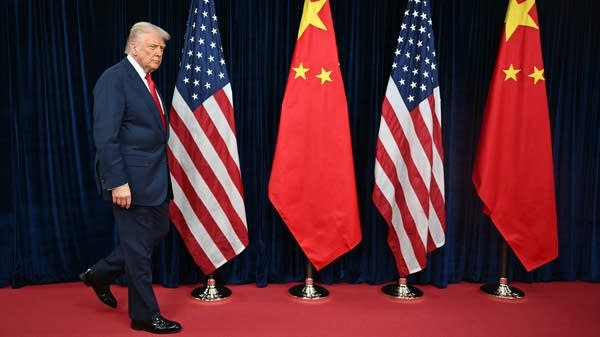Services make up more than two thirds of the U.S. economy. Here's how tariffs could affect them.
Services also account for about a third of U.S. exports.

The U.S. economy, for the most part, is a services economy. The services sector accounts for more than 70% of the country’s gross domestic product, according to the Bureau of Economic Analysis.
This month, that sector grew at its second-weakest pace in the past year, according to a new report out this morning from S&P Global.
The weak growth is thanks in large part to weaker demand. And businesses surveyed by S&P pinned the blame for that on all of the uncertainty surrounding the economy right now — particularly the president’s tariffs.
The U.S. exports about a trillion dollars-worth of services each year. That’s about a third of all U.S. exports.
“This would be things like law, consulting, accounting, financial services,” said Abby Samp with Oxford Economics.
Services like these are not directly subject to retaliatory tariffs right now, said Robert Johnson, an economics professor at the University of Notre Dame.
But he said the services sector will be indirectly affected by retaliatory tariffs on goods, because goods producers rely on the services sector.
“A car producer will use lawyers, accountants, and bankers, in order to produce that car, and so all of the services that those car firms use ought to be worried about retaliatory tariffs on U.S. exports of goods,” Johnson said.
China and other countries have plenty of other tools they can use to crack down on American services, he added.
“So for example, they could announce restrictions on the ability of U.S. consulting firms to do business in China, or restrictions on U.S. financial firms in selling financial services into various markets,” Johnson said.
The big concern for the services sector as a whole — both for firms that export and those that do all their business here — is what will happen if the tariffs cause the whole economy to contract, said Meagan Schoenberger, senior economist at KPMG.
“Because when economies either slow or enter a recession, spend on services tends to decline,” she said.
That’s something Matt Hetrick has already noticed. He runs an accounting firm called Harmony Group, and many of his clients are restaurant owners, who are especially vulnerable to tariffs on imported goods.
Hetrick said many of them are trying to cut back on accounting services.
“There have been people who’ve reduced the scope of their work with us, looked to move to a lower package or something of that nature, lower service level to help save some money to offset their input costs,” he said.
Hetrick said other clients are scaling back expansion plans, which is also not a great sign.
“We think there’s going to be a slowdown in the speed in which there are new … restaurants basically built,” he said.
In other words, if the restaurant industry contracts, Hetrick’s business could too.













